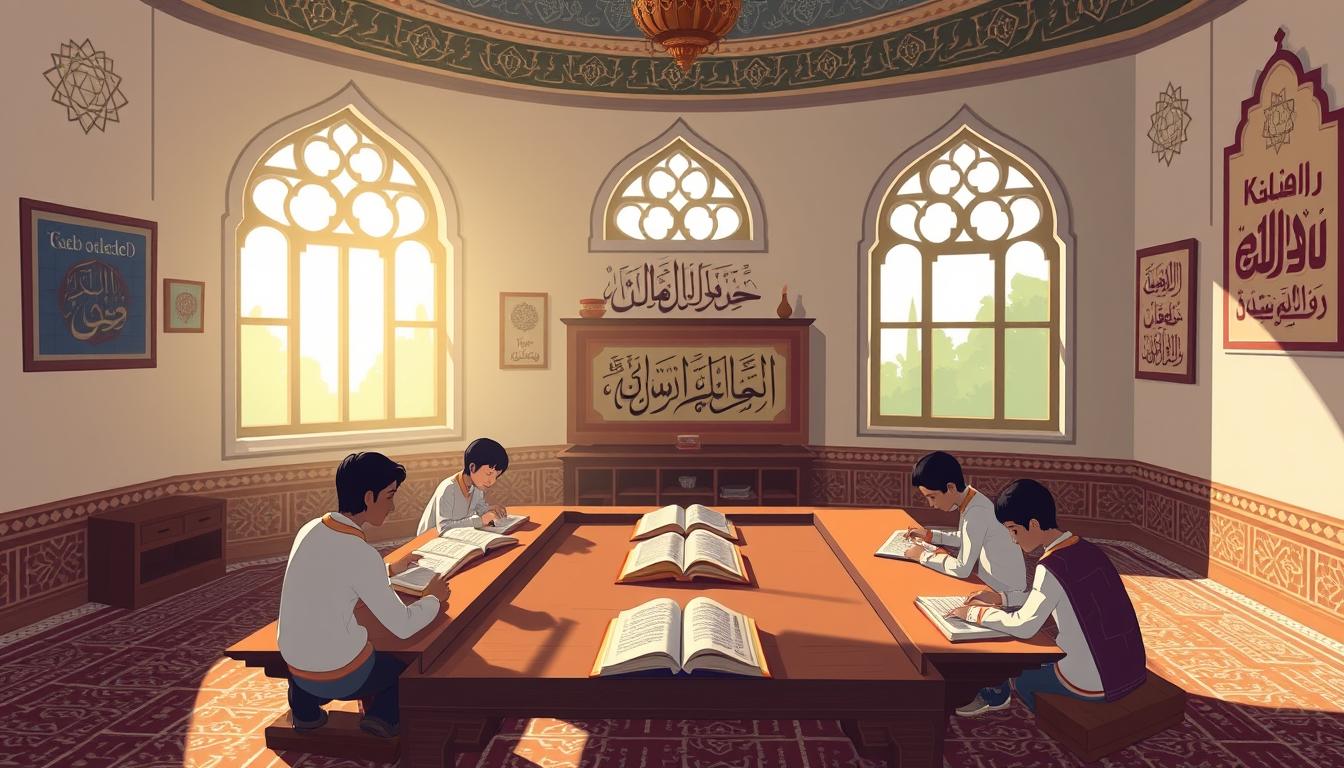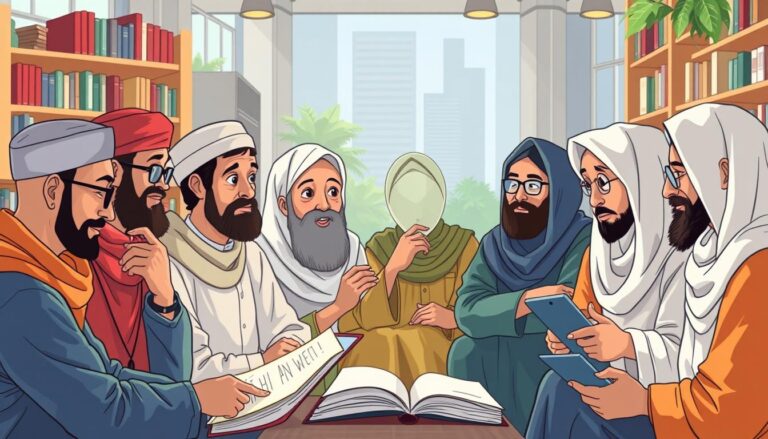The Role of Knowledge in Islam: Why It Matters
Have you ever thought about why Islam values knowledge so much? This question is key to understanding Islamic views on education and growth. In Islam, seeking knowledge is not just a suggestion; it’s a major duty for all Muslims.
Islam sees knowledge as a strong tool for deepening faith, personal growth, and helping society. The Quran and teachings of Prophet Muhammad highlight learning’s role in life. This focus on knowledge isn’t just for religious studies but also for science, medicine, and technology.
In the medieval ages, Islamic civilization was a hub of learning. Cities like Baghdad, Damascus, Cairo, and Granada were famous for their knowledge. This time, known as the Islamic Golden Age, saw big leaps in many fields of study.
Today, Islamic education is changing. While old ways of learning still exist, new methods like online classes are becoming popular. These changes make Islamic education more reachable, helping Muslims everywhere to seek knowledge.
Key Takeaways
- Seeking knowledge is obligatory for every Muslim
- Islamic education includes both religious and worldly knowledge
- The Quran and Hadith stress learning’s importance
- Knowledge is seen as a way to spiritual growth
- Islamic civilization historically made big contributions to various studies
- Modern methods are making Islamic education more accessible
Understanding the Significance of Knowledge in Islam
Islam values knowledge highly. Learning is seen as a noble act that strengthens the Muslim community. This focus on knowledge has led to great achievements in the Islamic Golden Age and continues to influence Muslim societies today.
The Quranic Perspective on Knowledge
The Quran promotes thinking and reflection. It tells believers to consider Allah’s creations and seek understanding. This divine call has inspired many scholars in Islam to make scientific breakthroughs in different areas.
Hadiths Emphasizing the Importance of Learning
Many hadiths show how much Islam values knowledge. One famous saying says, “The ink of the scholar is more precious than the blood of the martyr.” This shows the high esteem for learning and intellectual pursuits in Islamic tradition.
Knowledge as a Path to Spiritual Growth
In Islam, knowledge helps deepen faith and bring one closer to Allah. It improves critical thinking and broadens perspectives. Seeking knowledge is seen as a form of worship, leading to a deeper appreciation of Allah’s creation and His greatness.
“Seeking knowledge is a duty upon every Muslim.”
This hadith stresses the universal duty of learning in Islam. It applies to both religious and worldly knowledge. It encourages Muslims to excel in various fields and contribute to society’s progress.
Types of Knowledge in Islamic Tradition
Islamic education values learning highly. The Qur’an talks about “alim” (knowledgeable) 140 times. This shows how important knowledge is in Islam. It recognizes various types of knowledge, each with its own role in a Muslim’s life.
Individually Obligatory Knowledge
Fard ‘Ayn is knowledge every Muslim must have. It includes knowing Islam’s basics and how to practice it. The Qur’an mentions “al-‘ilm” in 27 verses, making this knowledge key.
Communally Obligatory Knowledge
Fard Kifayah is knowledge that helps the whole community. It covers areas like medicine, engineering, and law. Though not needed by all, it’s vital for the community’s growth. The Qur’an talks about writing in 319 verses, showing the value of learning in many forms.
Balancing Religious and Worldly Knowledge
Islam aims for a mix of spiritual and worldly education. The word ‘ilm and its forms are in 704 Quranic verses. This mix helps seekers grow spiritually and gain practical skills for success.
“Seek knowledge from the cradle to the grave.”
This hadith shows Islam’s view on learning all life long. It urges Muslims to keep learning in both spiritual and worldly areas. This balanced approach prepares believers for a fulfilling life and community service.
The Islamic Golden Age: A Testament to Knowledge
The Islamic Golden Age lasted from the mid-7th to mid-13th century. It was a time of great scientific progress and cultural growth. Scholars in Islam worked hard to learn about many subjects.
Learning centers flourished in the Muslim world. The University of Al Karaouine in Fez, Morocco, was founded in 859 CE. It became the oldest school to give out degrees. Al-Azhar University in Cairo, started in 975 CE, was a leader in advanced education.
The spread of Islam led to a big increase in learning. Baghdad became a key place for knowledge, with many book shops by 900 AD. The library in Tripoli had up to three million books, showing the importance of sharing knowledge.
- Muslim scholars made big steps in mathematics, creating algebra and algorithms
- They also made big advances in medicine, astronomy, and optics
- The House of Wisdom in Baghdad helped translate Greek scientific works into Arabic
This golden age still affects us today. Many words we use, like “algebra,” “algorithm,” and “zenith,” come from Arabic. This shows how Islamic scholarship has shaped our world.
“The ink of the scholar is more holy than the blood of the martyr.” – Prophet Muhammad
This time of growth not only improved science but also encouraged cultural exchange and new ideas. It helped set the stage for future achievements in many areas.
Knowledge as a Means of Worship and Closeness to Allah
In Islamic spirituality, knowledge is key to getting closer to Allah. The Quran and Prophet Muhammad’s teachings stress learning’s role in spiritual growth. They show how important it is to understand and learn.
Reflection and Contemplation in Islam
The Quran tells Muslims to think deeply about Allah’s creation. It has 750 verses on this topic, showing Islam’s value on deep thinking. This reflection helps believers see Allah’s wisdom and power more clearly.
The Concept of ‘Ilm in Islamic Spirituality
In Islam, ‘ilm (knowledge) is vital for spiritual growth. The Quran calls Allah “All-knowing” (‘aleem) 122 times, showing knowledge’s value. Prophet Muhammad said, “Knowledge is the root of all good and ignorance is the root of all bad.” This emphasizes the need to seek knowledge in faith.
Knowledge as a Form of Ibadah
Seeking knowledge is seen as a form of worship (ibadah) in Islam. The Prophet said, “A small amount of knowledge is better than much worship.” This shows learning is not just encouraged but is sacred. By learning, Muslims can deepen their faith and become more God-conscious (taqwa).
“The closest of men to the status of prophethood are those who are accustomed to knowledge and struggle.”
Islam encourages seeking both religious and worldly knowledge. Muslims are urged to explore fields like medicine, engineering, and science. This approach to learning helps believers understand Allah’s creation and grow closer to Him through their studies.
The Role of Scholars in Islamic Society
Scholars in Islam are key figures in guiding Muslim communities. They interpret religious texts and offer guidance on Islamic life. Their knowledge covers theology, jurisprudence, Quranic studies, and Islamic spirituality.
Islamic education flourishes thanks to these scholars. They teach in madrasas and universities, sharing wisdom with new generations. Their lessons include Quranic exegesis, Arabic language, and grammar. This ensures Islam’s intellectual heritage is preserved and spread.
Scholars’ influence goes beyond religious topics. They have contributed to philosophy, science, and mathematics. This diversity promotes critical thinking and helps Muslim societies tackle new challenges.
“The scholars are the inheritors of the prophets.”
This hadith emphasizes scholars’ importance in Islam. They preserve the Quran and Hadith, ensuring their accuracy. Scholars interpret these texts for today’s issues, helping Muslims make moral and ethical decisions.
The spread of Islam is greatly thanks to scholars. Their dedication to knowledge and service has guided Muslim communities for centuries. As keepers of Islamic knowledge, scholars shape the spiritual and intellectual world of Muslims.
Islamic Education: Past and Present
Islamic education has changed over time. It has kept its core values while meeting new needs. The Quran says, “Allah will raise those who have believed among you and those who were given knowledge by degrees” (58:11). This shows how much Islam values learning.
Traditional Islamic Educational Institutions
Long ago, learning happened in mosques and madrasas. These places taught about religion, Arabic, and more. Madrasas started in the 10th century. They taught a wide range of subjects, including medicine and math.
In Morocco, madrasas had a 16-year program. This shows how deep the study was.
Modern Approaches to Islamic Education
Now, Islamic education uses new teaching methods. Many places offer online courses. This makes learning easier for more people.
It lets students learn at their own speed. They can balance school with other life things. Technology plays a big role in this change.
The Integration of Islamic and Secular Education
Today, Islamic education mixes religious and secular learning. This makes students well-rounded. They can help society and stay true to their faith.
Schools now teach Islamic studies and subjects like science and languages. This helps students deal with today’s world while keeping their faith.
“The ink of the scholar is more sacred than the blood of the martyr.” – Prophet Muhammad (ﷺ)
This saying shows how much Islam values education. It tells Muslims to keep learning all their lives. They should seek knowledge in both religious and worldly areas.
The Pursuit of Knowledge: A Lifelong Journey in Islam
In Islam, learning is very important throughout life. It’s seen as a sacred duty for all Muslims. This duty goes beyond just religious studies. It includes fields like science, medicine, technology, and social studies.
People who seek knowledge in Islam are highly valued. A famous saying compares the value of a scholar’s knowledge to the blood of a martyr. This shows how much Islam values education. It encourages Muslims to keep learning and understanding the world.
The importance of learning in Islam is clear in some statistics:
- 85% of Muslims believe self-reflection is key to spiritual growth.
- 92% say strengthening their faith through community and scripture studies improves their spiritual life.
- 78% find exploring their beliefs helps them understand their spiritual identity better.
These numbers show how vital learning is in Islam. It’s not just about schoolwork. It’s about growing personally and spiritually. The journey of learning in Islam never ends, offering endless chances for growth.
“Seek knowledge from the cradle to the grave.”
This saying sums up Islam’s view on learning. It tells Muslims to keep learning from birth to old age. This dedication to learning helps with personal growth, spiritual development, and progress in society.
Knowledge and Character Development in Islam
In Islamic spirituality, knowledge is key to shaping one’s character. The Quran says those with knowledge truly fear Allah. This shows how learning affects spiritual growth and ethical behavior.
The Relationship Between Knowledge and Taqwa
Taqwa, or God-consciousness, grows with knowledge. As Muslims learn more about their faith, they feel Allah’s presence more. This awareness helps them make better choices and builds a stronger moral character.
Knowledge as a Tool for Self-improvement
Islam sees learning as a way to improve oneself. The Prophet Muhammad taught that seeking knowledge is a duty for every Muslim. This shows learning’s role in personal growth and spiritual development.
The Ethical Responsibilities of the Knowledgeable
Scholars in Islam have a big responsibility. They must use their knowledge to help others and stay humble. The Prophet said the ink of scholars is more sacred than the blood of martyrs, showing scholars’ high status.
“Whoever follows a path in pursuit of knowledge, Allah makes easy for him a path to Paradise.”
This hadith highlights Islam’s value on learning and its spiritual rewards. It encourages Muslims to see learning as a lifelong journey. It links education to character development and closeness to Allah.
Challenges and Opportunities in Seeking Knowledge Today
In today’s digital world, seeking knowledge comes with its own set of challenges and opportunities. The first word to Prophet Muhammad (peace be upon him) was “Iqra”, meaning “read”. This sets the stage for Islam’s emphasis on learning. Now, Muslims face a sea of information, balancing religious and secular studies while keeping their sources authentic.
Islamic education has grown, offering new ways to learn. With online resources and global networks, Muslims can access a wide range of educational platforms. Nahela Morales, a Muslim convert, is a great example. She speaks about Islam in places like Sweden, Colombia, and Brazil. Her work with CAIR DFW shows how knowledge can lead to advocacy and civil rights.
For new Muslims starting their Islamic education, books like “The Book of Manners” and “The New Muslim’s Field Guide” are helpful. These books guide them through the history of Muslim scholarship. This scholarship has enriched fields like mathematics and medicine. By facing both challenges and opportunities, today’s Muslims carry on the tradition of seeking knowledge that has been key to Islam for over 1400 years.
Source Links
- Importance of Seeking Knowledge in Islam
- Importance Of Seeking Knowledge In Islam | Read 9 Benefits
- Cite as :Paper Title; Vol. …|Issue ….|Pg:102-107
- Importance of seeking Knowledge in Islam
- The Importance of Seeking Knowledge in Islam
- The Islamic Concept of Knowledge
- The Meaning of True Knowledge in Islam
- Islamic Golden Age | Islamic History
- Islam and the Quest for Knowledge
- The Air of History Part III: The Golden Age in Arab Islamic Medicine An Introduction
- Knowledge of Islam and the modern world
- When seeking knowledge of Allah
- Islam and the Pursuit of Worldly Knowledge
- Scholars of Islam: Preserving Knowledge and Guiding the Ummah
- Why We Need Ulama: The Importance of Seeking Islamic Knowledge From Scholars | Yaqeen Institute for Islamic Research
- The Islamic Era and Its Importance to Knowledge and the Development of Libraries
- The Importance of Education in Islam: From the Perspective of Quran and Sunnah
- Education – Muslim, Aims, Purposes | Britannica
- A History of Education: The Islamic World: Basics
- The Importance of Seeking Knowledge in Islam
- The Journey of Self-Discovery: Exploring Identity and Purpose in Islam – Tazkiyah
- Discover Power Of Seeking Knowledge In Islam: Essential Insights
- Character in Islam: An Introduction5 min read
- Akhlāq 101: Character Development For Muslims I Dr. Yasir Qadhi
- Your Very First Steps to Seek Knowledge About Islam | About Islam
- Seeking Knowledge3 min read







